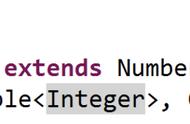在 JavaScript 中,有一个特殊的数据类型BigInt,它可以存储非常大的整数,甚至可以存储超过 2 的 32 次方的所有整数。
BigInt是一种无符号整数类型,它可以表示任何正整数,包括无限大和无限小。JavaScript 中的BigInt使用二进制表示法,因此它的值是无限的,并且永远不会溢出或产生舍入误差。
要创建BigInt对象,可以使用Number.bigInt方法。例如,以下代码将创建一个非常大的整数:
let bigInt = Number.bigInt(2**32 1);
在这个例子中,2**32 1是一个非常大的整数,它可以使用 32 位二进制表示。Number.bigInt方法将返回一个BigInt对象,可以表示这个非常大的整数。
如何创建 BigInt ?可以用在一个整数字面量后面加 n 的方式定义一个 BigInt ,如:120n,或者调用函数BigInt()。
const theBiggestInt = 9007199254740991n; const alsoHuge = BigInt(9007199254740991); console.log(theBiggestInt, alsoHuge); // 9007199254740991n 9007199254740991n安全整数的范围
超过这个范围,number类型的数字将会失去精度
Number.MAX_SAFE_INTEGER // ↪ 99007199254740991 最大安全整数 Number.MIN_SAFE_INTEGER // ↪ -99007199254740991 最小安全整数如何使用BigInt
- 可以用在一个整数字面量后面加 n 的方式定义一个 BigInt ,如:10n,
- 或者调用构造函数 BigInt()(不能使用 new 运算符)并传递一个整数值或字符串值。
const theBiggestInt = 9007199254740991n; const alsoHuge = BigInt(9007199254740991); // ↪ 9007199254740991n const hugeString = BigInt("9007199254740991"); // ↪ 9007199254740991n const hugeHex = BigInt("0x1fffffffffffff"); // ↪ 9007199254740991n const hugeBin = BigInt("0b11111111111111111111111111111111111111111111111111111"); // ↪ 9007199254740991nBigInt类型判断
typeof 123 // ↪ 'number' typeof 123n // ↪ 'bigint' typeof BigInt(123) // ↪ ''bigint'BigInt运算
但是BigInt不支持单独使用运算符 ,因为会默认为转换成Number,这是不允许的。
const previousMaxSafe = BigInt(Number.MAX_SAFE_INTEGER); // ↪ 9007199254740991n const maxPlusOne = previousMaxSafe 1n; // ↪ 9007199254740992n const theFuture = previousMaxSafe 2n; // ↪ 9007199254740993n, this works now! const multi = previousMaxSafe * 2n; // ↪ 18014398509481982n const subtr = multi – 10n; // ↪ 18014398509481972n const mod = multi % 10n; // ↪ 2n const bigN = 2n ** 54n; // ↪ 18014398509481984n bigN * -1n // ↪ –18014398509481984n const expected = 4n / 2n; // ↪ 2n const rounded = 5n / 2n; // ↪ 2n, not 2.5nBigInt比较大小
// 不严格相等,严格不相等 0n === 0 // ↪ false 0n == 0 // ↪ true // Number 和 BigInt 可以直接比较。 1n < 2 // ↪ true 2n > 1 // ↪ true 2 > 2 // ↪ false 2n > 2 // ↪ false 2n >= 2 // ↪ true // BigInt可以和Number混入数组中进行排序 const mixed = [4n, 6, -12n, 10, 4, 0, 0n]; // ↪ [4n, 6, -12n, 10, 4, 0, 0n] mixed.sort(); // ↪ [-12n, 0, 0n, 10, 4n, 4, 6]BigInt无法使用JSON.stringify()方法
对任何 BigInt 值使用 JSON.stringify() 都会引发 TypeError,因为默认情况下 BigInt 值不会在 JSON 中序列化。但是,如果需要,可以实现 toJSON 方法:
BigInt.prototype.toJSON = function() { return this.toString(); } // 现在可以 JSON.stringify(BigInt(1)); // ↪ '"1"'
需要注意的是,BigInt对象是不可变的,也就是说,一旦创建,就无法更改其值。如果需要更改BigInt对象的值,必须创建一个新的BigInt对象。
BigInt对象在 JavaScript 中主要用于处理非常大的整数,例如在密码学和安全方面。
总结- BigInt不能和Number类型数据混合运算,两者必须转换成同一种数据类型。BigInt和Number联众类型互相转换时,要注意可能会丢失精度
- BigInt和Numner可以直接作大小比较。
- BigInt可以和大部分运算符一起使用,除了单独使用 ,因为会默认强制转化类型。
- BigInt作为条件判断转为Boolean时,和Number类型一致。
- 默认情况下BigInt无法在JSON中序列化
- bignumber.js 也是一种处理最大安全整数的方法
- BigInt不能调用Math中的方法

























